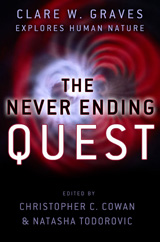 |
||||
 |
||||
 |
||||
 |
||||
|
||||||

The Never Ending Quest is the seminal work on Gravesian theory. The Never Ending Quest addresses central questions of our times, and all times. "According to this conception we do ourselves a disservice by arguing whether man’s nature is good or bad, active or reactive, mechanical or teleological. Man’s nature is emergent. What man is cannot be seen before. We can see it only insofar as it has been revealed to us by his movement through the levels of human existence. And, what has been revealed to us, so far, is that in some way or another man’s nature is all of these and more. Our very conception envisages that new aspects of man are now before us which were not seen before, and that the man that man now is will go on proliferating into new forms if the conditions for human existence continue to improve." p 480 The Never Ending Quest challenges orthodoxies, asks us to do better, and shows how. "This statement will be heretical to some, communistic to others and anarchistic to many. But let me explain what is meant by the assertion. This world, as we all know, is full of paradoxes, but of all that exist, the most paradoxical, it seems to me, is the one which arises when man’s need for independence begins to emerge. As man starts his transition from the absolutistic form for existence, the ordered, authoritarian, submissive way of life, and as man moves through the stage of independence on into the sociocentric ways for being, five definable and describable states of existence emerge, one after another, in our ordered hierarchical way. These five states, each of which has a strong flavor of selfish independence in them, have brought more that is good to man and more that is bad for him than all states of existence which preceded them. No states of existence prior to these five have given man more power over the physical universe, more verifiable knowledge, or a greater increase in his material welfare than have they. But no states are more certain to pave the way for man’s demise than these five unless we can move, at least the leadership of man, beyond these states where man believes that the epitome of human living lies somewhere with one or some of the ER states of existence." p 283 The Never Ending Quest contains the preface and chapters from Dr. Graves's unfinished manuscript on the development and details of his double-helix theory of personality and culture (chapters 1-6). He also reports verification studies and comparisons with other researchers (chapter 15), and then addresses the broader meanings of the concept to psychology and social development (chapter 16). These conversations, which run throughout the entire text, range from education to business to large-scale systems change. The middle section, a discussion of each of the eight nodal levels of psychological existence and transitional states (chapters 7-14), is also entirely in Dr. Graves's words. However, each is a compilation of verbatim excerpts compiled by the editors from published and unpublished Graves writings, as well as recorded presentations and seminars in which Dr. Graves discusses his theory. (Because of health problems, he was never able to complete this part of his book himself.) These chapters are organized to provide a comprehensive view of the levels, their psychologies, management, learning, and transitional forces with emphasis given to his later ideas when they differed from his earlier work. (Table of contents and editors' foreword in .pdf) The Never Ending Quest is foundational reading for any dedicated Gravesian or person newly-interested in understanding the emergent human systems perspective of Dr. Clare W. Graves. It will be a significant addition for the psychology of individual and societal development, for managing and teaching people whose mindsets differ, for strategic planning incorporating deeper human factors into organization transformations, and the curious, ordinary person intrigued by human life - what it is and what it is meant to be. The book is essential for those involved in Spiral Dynamics® or its derivatives and the spin-offs rooted in the emergent cyclical point of view since it clarifies Dr. Graves's conception of how conditions outside the person(s) and neurological systems inside interact to produce the emergent, cyclical, levels of existence; explains the 'levels' in more accurate detail than ever before; and discusses the realities of the theory - what it is and what it can still become |
||||||